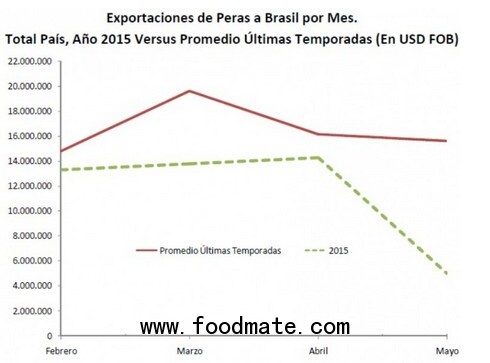According to the Brazilian health authorities, the limitation would only be lifted in July, but according to a report from the Ideal Foundation, the fruit will be difficult to market because of maturation problems, which especially affect the Williams variety.
The province of Mendoza alone, which has some 4,000 hectares devoted to pear, hasn't been able to move 100,000 boxes of Williams pears and 250,000 boxes of Packam pears to the Brazilian market because of the ban.
It is a very serious situation because at this time of the season Brazil is the only international destination for these fruits and would have to be sold at 50% of their price in the local market if needed.
Meanwhile, producers in the Upper Black River Valley, the main fruit producing region of the country, have decided to protest against the national government's lack of response to the claims they have been making.
"We currently have serious economic losses and financial difficulties producing and marketing pears and apples because of internal costs, the exchange rate for the fruit sector and the reality of international markets," stated Argentina's Chamber of Integrated Fruit Producers (CAFI).
"An example of the inequality in the distribution of income is that consumers in Argentina pay 30 pesos for a kilo of apples and the state receives 10.5% of that price, i.e. about 3 pesos, while producers fail to collect 1.50 per kilo, "said Raul Ferragut, a local journalist specializing in agriculture.
The province of Mendoza alone, which has some 4,000 hectares devoted to pear, hasn't been able to move 100,000 boxes of Williams pears and 250,000 boxes of Packam pears to the Brazilian market because of the ban.
It is a very serious situation because at this time of the season Brazil is the only international destination for these fruits and would have to be sold at 50% of their price in the local market if needed.
Meanwhile, producers in the Upper Black River Valley, the main fruit producing region of the country, have decided to protest against the national government's lack of response to the claims they have been making.
"We currently have serious economic losses and financial difficulties producing and marketing pears and apples because of internal costs, the exchange rate for the fruit sector and the reality of international markets," stated Argentina's Chamber of Integrated Fruit Producers (CAFI).
"An example of the inequality in the distribution of income is that consumers in Argentina pay 30 pesos for a kilo of apples and the state receives 10.5% of that price, i.e. about 3 pesos, while producers fail to collect 1.50 per kilo, "said Raul Ferragut, a local journalist specializing in agriculture.






